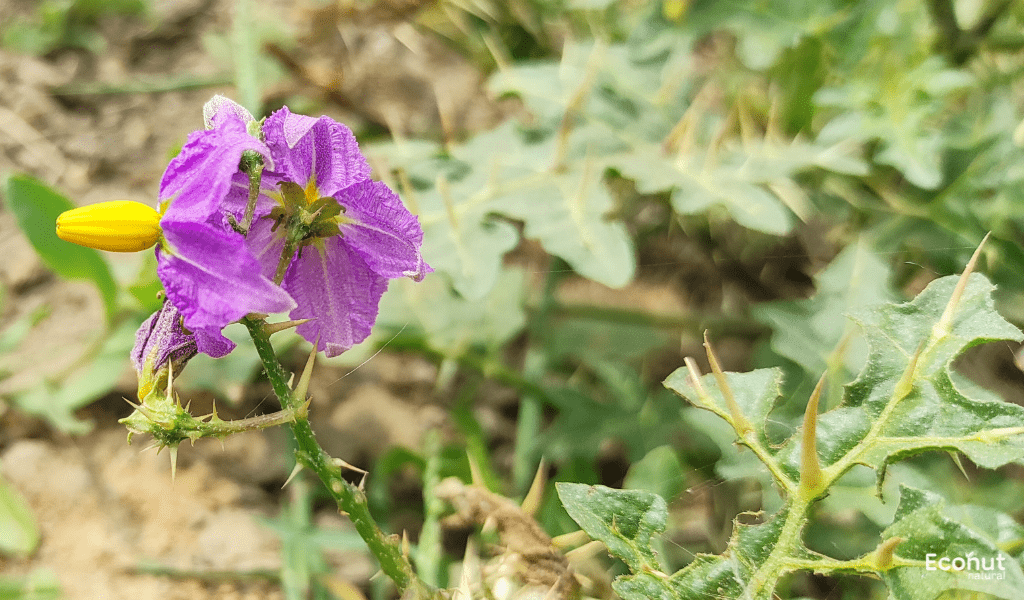Kantkari (Solanum Xanthocarpum) One Ayurvedic herb that is helpful for throat issues . Common names for this herb include Indian Nightshade and Yellow-Berried Nightshade. Due to its many qualities, including anti-inflammatory, antitussive, anti-asthmatic, hypoglycemic, antipyretic, antihistamine, and antispasmodic, it is particularly beneficial for a number of other conditions besides throat issues.
The perennial herb kantakari has purple-blue flowers. The cylindrical root has many tiny rootlets and measures 10-45 cm in length. Its trunk is green, and its juvenile branches are densely haired.
Description
Solanum surattense is the mature, dried entire plant that is used to make katakari (Solanum xanthocarpum). This perennial herb of wasteland is incredibly prickly and can be found throughout India.
Botanical Name:
Solanum Xanthocarpum
Family:
Solanaceae
Leaves:
Its leaves measure 10–13 cm in length and 5-7 cm in breadth. It is a glossy green color. The dorsal surface of leaves has thorns.
Flowers:
The purple, two-centimeter-long flowers of the kantakari plant are produced. The blooms are situated on short, curving, hairy pedicels, or flower stalks, and have five lobes.
Stems:
The perennial stems of the Kantakari plant are bright green and spiky. These stems can reach a height of two to three meters, and their base is slightly woody. Dense stellate tomentum, or small star-shaped hairs, covers the younger stems.
Fruits:
The Kantakari plant bears berries, which range in diameter from 1.3 to 2.0 cm. The expanded calyx (the flower’s persistent sepals) encircles these berries, which might be yellow or white with green veins.
Root:
10-45 cm long, a few mm to two cm in diameter, nearly cylindrical, tapering, with several tiny longitudinal and transverse wrinkles, lenticels, and tiny rootlets scattered throughout. The transversely smoothed surface displays a thin bark layer and a broad, compact cylinder of wood, with a short, bitter taste.
Seeds:
The berry of the kantakari plant contains many seeds that are produced by the plant. These seeds have a diameter of around 0.25 cm, are yellowish-brown, glabrous (smooth), and sub-reniform (kidney-shaped).
Habitat:
This species is primarily found in waste areas and by the sides of roads in Bengal, Assam, and India.
Parts Used:
- Root
- Fruit
- Whole Plant
Dosage:
- Juice: 10-20 ml
- Powder: 3-6 gm
- Decoction: 20-30 ml
Chemical Constituents
Alkaloids, phenolics, flavanoids, sterol, saponins, and their glycosides are among the many therapeutic properties of Solanum xanthocarpum.
Synonyms
- Kshudra
- Dusparsha
- Vyaghri
- Nidigdhika
- Kantalika
- Kantakini
- Dhvani
Other Language Names of Kantkari (Solanum Xanthocarpum)
Hindi name – Rengni
Gujarati name – Bhonyarengni
Bengali name – Kantikari
Tamil name – Kandankantiri
Kannada name – Nella Gullu
Telgu name – Challan mulaga
English name – Wild Eggplant
Scientific Classification
| Family | Solanaceae |
| Genus | Solanum |
| Species | S.Virginianum |
Ayurvedic Properties
Rasa (Taste) – Tikta (Bitter) and Katu (Pungent)
Guna (Quality) – Laghu (light) and Ruksha (Dry)
Veerya (Potency) – Ushna (hot)
Vipaka (Post Digestive Effect) – Katu (Pungent)
Kantkari (Solanum Xanthocarpum) Uses
- Its powder helps stimulate the digestive fire and increase hunger.
- This plant has an anti-inflammatory and blood-purifying function, which helps support heart health and treats a variety of inflammatory and skin disorders.
- This herb also helps with dandruff and improves the health of hair; to use it, juice 30 to 50 milliliters of the plant, apply it to the scalp, let it sit for an hour, and then wash it off with herbal shampoo.
- Other than that, this herb’s benefits include the following. It is primarily helpful for various respiratory conditions.
- Applying Kantkari juice to the nose helps to stimulate the nerves, which makes it very helpful for disorders like epilepsy and convulsions.
Kantkari (Solanum Xanthocarpum) Benefits
Treats Urinary Problems:
Kantakari (Solanum Xanthocarpum) herb’s natural diuretic action boosts urine production and gets rid of dangerous poisons from the body. This herb helps the body rid itself of salt, which lowers blood pressure. Additionally, the antibiotic quality of kantakari prevents the growth of bacteria and treats symptoms like burning, bladder, and back pain as well as weakness and vomiting that are linked to urinary tract infections.
Cures asthma:
Asthma is a chronic inflammatory lung disorder affecting the airways. There are numerous ways to treat asthma symptoms and maintain lung function with the kantakari plant. In humans, asthma is mediated by the chemical histamine. The potent antihistaminic qualities of kantakari extract shield the airways against constriction brought on by histamine. Furthermore, the Kantakari formulation widens the bronchioles while reducing edema and mucus production.
Augments Liver Health:
The hepatoprotective and antioxidant properties of kantakari extract prevent damage from free radicals, which in turn inhibits the oxidation of healthy cells. The medical composition has the potential to regenerate new cells, enhance the liver’s metabolism, and optimize the liver’s appropriate functioning.
Facilitates digestion:
The benefits of kantakari extract include improved digestion and relief from dyspepsia. Indigestion is primarily caused by a weak digestive fire, or agnimandya, which is intensified Kapha dosha. Eating powdered kantakari increases one’s Agni and facilitates the breakdown of food. The Deepan and Pachan qualities of Kantakari are credited with this.
Read Also: Atibala, Country mallow, (Abutilon Indicum) – Properties,Uses, Benefits & Side Effects
Kantkari (Solanum Xanthocarpum) Side Effects
Pregnant and breastfeeding women:
The safety of Kantkari for women who are expecting or nursing is not well enough known. If you are expecting or nursing a baby, it is advised to refrain from using it.
May interact with medications:
Certain drugs, such as diuretics and blood thinners, may interact with kantkari. If you are on any drugs, it is crucial that you speak with a healthcare provider before using Kantkari.
Conclusion
Kantakari has numerous health advantages. It is used to treat brain diseases, diabetes, liver damage, inflammation, cancer, and asthma. It has antioxidant and antibacterial qualities as well. See a physician before taking Kantakari for any of these ailments or health advantages.
FAQS
What is Kantkari used for?
The perennial herb Solanum xanthocarpum (Solanaceae) has long been used to treat heart conditions, fever, and coughing. It possesses a number of pharmacological actions, including aphrodisiac, hypotensive, antianaphylactic, antipyretic, and anticancer properties.
What is the benefit of Kantakari seeds?
Kantakari has numerous health advantages. It is used to treat brain diseases, diabetes, liver damage, inflammation, cancer, and asthma. It has antioxidant and antibacterial qualities as well. See a physician before taking Kantakari for any of these ailments or health advantages.
What advantages does Kantakari have for diabetes?
The effects of kantakari extract for lowering blood sugar have been proven.

